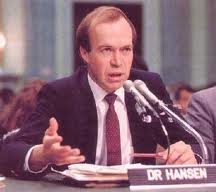After Al Gore, James Hansen is probably the man climate skeptics most love to hate. Unlike Gore, Hansen is an actual scientist, at NASA’s Goddard Institute for Space Studies in New York (it’s located above the restaurant that used to be featured in Seinfeld). It was Hansen who single-handedly put climate change on the national radar when he testified before Gore’s committee in 1988 during a killer heat wave, saying “. . . the evidence is pretty strong that the greenhouse effect is here.”
Nearly a quarter of a century later, Hansen is more deeply immersed in the issue of climate change than ever. He’s still writing scientific papers — a new one, titled “Public Perception of Climate Change and the New Climate Dice,” which argues that the notable recent increase in climate extremes is no accident, has been submitted to Proceedings of the National Academy of Sciences.
He’s also come out of the ivory tower to join protests against coal-fired power plants (he was arrested outside the White House) and the Keystone XL pipeline (another arrest, same place). And he’s speaking out wherever and whenever he can about the dangers of climate change, along with our responsibility to do something about it — in a recent TED talk, for example, and in an even more recent interview with The Guardian, in which he declared that human climate change is a “great moral issue” on a par with slavery — an “injustice of one generation to others.”
It was Hansen’s 2008 paper suggesting 350 parts per million (ppm) of CO2 in the air as the level we should aim for that launched the activist organization 350.org (we’re already approaching 400 ppm, with no appreciable emissions slowdown).
No wonder skeptics dislike the guy, and go out of their way to try and shoot down his scientific work. So far, it hasn’t worked out so well. At around the same time Hansen gave his 1988 Congressional testimony, he put together a projection of future temperature rise — a projection skeptics have jumped on as being an “astounding failure.” Not really, though.
Recently, the bloggers at RealClimate.org have unearthed an even earlier Hansen projection, from a paper (pdf) published in Science all the way back in 1981. At the time, the authors of a recent post on the paper point out, global temperatures were actually cooler than they’d been since the early 1940’s, thanks to the shadow cast by clouds of pollution — and yet, write the authors, “[Hansen and his co-authors] confidently predicted a rise in temperature due to increasing CO2 emissions.” In fact, they underestimated the temperature increase we’d see 2010 by about 30%, so Hansen was indeed wrong. He was too conservative. But the authors continue
“. . . a projection from 1981 for rising temperatures in a major science journal, at a time that the temperature rise was not yet obvious in the observations, has been found to agree well with the observations since then, underestimating the observed trend by about 30%, and easily beating naive predictions of no-change or a linear continuation of trends. It is also a nice example of a statement based on theory that could be falsified and up to now has withstood the test. The ‘global warming hypothesis’ has been developed according to the principles of sound science.”
Some of his colleagues in the mainstream climate-science community are reluctant to go as far out on a limb as Hansen. They aren’t comfortable crossing the line that separates science from activism, although everyone agrees that Hansen keeps his activist views out of his scientific work, which is why his science is still taken very seriously. They sometimes challenge his scientific work as well — not everyone agrees with the interpretation of evidence that led Hansen to declare 350 ppm as the proper target for atmospheric CO2 — but every top scientist, including Einstein, has had his or her work challenged. It’s how science works.
At age 70, James Hansen shows no evidence of slowing down. As the RealClimate post makes clear, he’s been doing impressive science since 1981, at least, and he’s still a prolific, highly respected climate scientist. He’s also a vigorous spokesman for humanity’s obligation to do something about our greenhouse gas emissions, and soon. Skeptics might hate him, but he’s not going away.
This article was originally published on Climate Central – www.climatecentral.org. Reproduced with permission.










